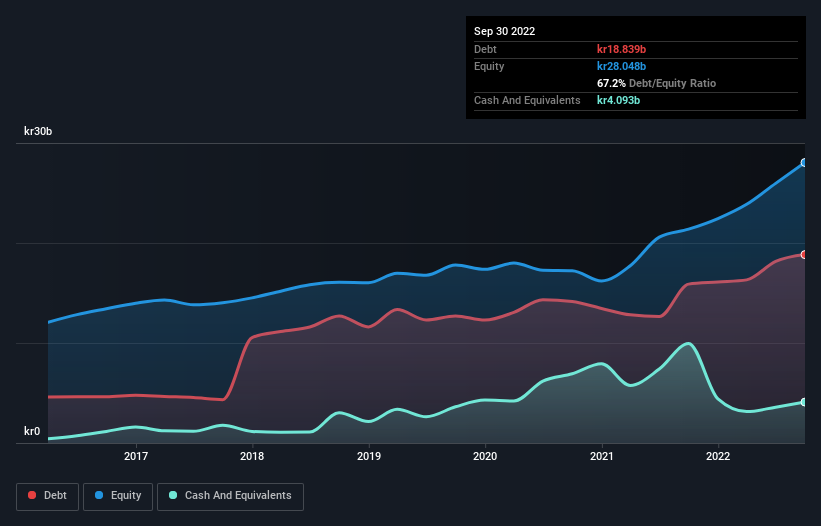
The external fund manager backed by Berkshire Hathaway’s Charlie Munger, Li Lu, makes no bones about it when he says ‘The biggest investment risk is not the volatility of prices, but whether you will suffer a permanent loss of capital.’ When we think about how risky a company is, we always like to look at its use of debt, since debt overload can lead to ruin. As with many other companies Dometic Group AB (publ) (STO:DOM) makes use of debt. But is this debt a concern to shareholders?
When Is Debt Dangerous?
Debt is a tool to help businesses grow, but if a business is incapable of paying off its lenders, then it exists at their mercy. In the worst case scenario, a company can go bankrupt if it cannot pay its creditors. While that is not too common, we often do see indebted companies permanently diluting shareholders because lenders force them to raise capital at a distressed price. Of course, plenty of companies use debt to fund growth, without any negative consequences. The first step when considering a company’s debt levels is to consider its cash and debt together.
View our latest analysis for Dometic Group
How Much Debt Does Dometic Group Carry?
The image below, which you can click on for greater detail, shows that at September 2022 Dometic Group had debt of kr18.8b, up from kr15.9b in one year. On the flip side, it has kr4.09b in cash leading to net debt of about kr14.7b.

How Healthy Is Dometic Group’s Balance Sheet?
Zooming in on the latest balance sheet data, we can see that Dometic Group had liabilities of kr13.2b due within 12 months and liabilities of kr20.8b due beyond that. On the other hand, it had cash of kr4.09b and kr4.30b worth of receivables due within a year. So it has liabilities totalling kr25.7b more than its cash and near-term receivables, combined.
Given this deficit is actually higher than the company’s market capitalization of kr23.7b, we think shareholders really should watch Dometic Group’s debt levels, like a parent watching their child ride a bike for the first time. Hypothetically, extremely heavy dilution would be required if the company were forced to pay down its liabilities by raising capital at the current share price.
We use two main ratios to inform us about debt levels relative to earnings. The first is net debt divided by earnings before interest, tax, depreciation, and amortization (EBITDA), while the second is how many times its earnings before interest and tax (EBIT) covers its interest expense (or its interest cover, for short). This way, we consider both the absolute quantum of the debt, as well as the interest rates paid on it.
Dometic Group’s debt is 3.3 times its EBITDA, and its EBIT cover its interest expense 7.0 times over. Taken together this implies that, while we wouldn’t want to see debt levels rise, we think it can handle its current leverage. We note that Dometic Group grew its EBIT by 24% in the last year, and that should make it easier to pay down debt, going forward. There’s no doubt that we learn most about debt from the balance sheet. But it is future earnings, more than anything, that will determine Dometic Group’s ability to maintain a healthy balance sheet going forward. So if you’re focused on the future you can check out this free report showing analyst profit forecasts.
Finally, a business needs free cash flow to pay off debt; accounting profits just don’t cut it. So the logical step is to look at the proportion of that EBIT that is matched by actual free cash flow. Looking at the most recent three years, Dometic Group recorded free cash flow of 50% of its EBIT, which is weaker than we’d expect. That’s not great, when it comes to paying down debt.
Our View
Neither Dometic Group’s ability to handle its total liabilities nor its net debt to EBITDA gave us confidence in its ability to take on more debt. But the good news is it seems to be able to grow its EBIT with ease. Looking at all the angles mentioned above, it does seem to us that Dometic Group is a somewhat risky investment as a result of its debt. That’s not necessarily a bad thing, since leverage can boost returns on equity, but it is something to be aware of. The balance sheet is clearly the area to focus on when you are analysing debt. But ultimately, every company can contain risks that exist outside of the balance sheet. Be aware that Dometic Group is showing 2 warning signs in our investment analysis , and 1 of those is concerning…
Of course, if you’re the type of investor who prefers buying stocks without the burden of debt, then don’t hesitate to discover our exclusive list of net cash growth stocks, today.
Valuation is complex, but we’re helping make it simple.
Find out whether Dometic Group is potentially over or undervalued by checking out our comprehensive analysis, which includes fair value estimates, risks and warnings, dividends, insider transactions and financial health.
Have feedback on this article? Concerned about the content? Get in touch with us directly. Alternatively, email editorial-team (at) simplywallst.com.
This article by Simply Wall St is general in nature. We provide commentary based on historical data and analyst forecasts only using an unbiased methodology and our articles are not intended to be financial advice. It does not constitute a recommendation to buy or sell any stock, and does not take account of your objectives, or your financial situation. We aim to bring you long-term focused analysis driven by fundamental data. Note that our analysis may not factor in the latest price-sensitive company announcements or qualitative material. Simply Wall St has no position in any stocks mentioned.
Source link
